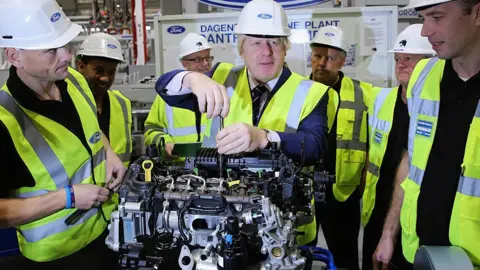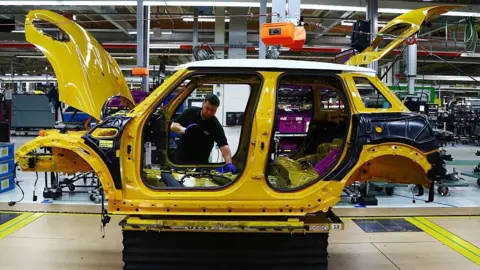What Boris Johnson's mistake tells us about our future

 Getty Images
Getty ImagesThis is a political victory for the prime minister with up front control "taken back" in a deal struck in a very short time.
In economic terms, it prevents the equivalent of a low level tariff trade war with our biggest trading partner breaking out, in the middle of an historic recession and health crisis.
The UK has stayed in a free trade zone stretching from Iceland to Russia, as Vote Leave promised ahead of the referendum.
But his manifest error in declaring there are "no non-tariff barriers" for trade with the EU had business leaders falling off their chairs.
This is patently not the case. The government has entire websites informing the public and businesses of tens of millions of new customs declarations, export health checks, regulatory checks, rules of origin checks, conformity assessments.
Trade barriers 'avalanche'
But while we wait for 2,000 pages of legal detail, that quote might help both explain a lot about the last four years, and map out some rocky moments ahead.
It is possible that the prime minister has a different definition of what the phrase means. He seemed, when questioned to confuse them with technical standards for plugs.
But any government confusion about this is about to meet a brick wall of reality from January. Industries are having to replicate regulatory processes for the UK market that previously existed only for the EU, doubling the cost.
The deal mitigates the impact of some of this. But there is no precedent for the avalanche of new trade barriers that is coming. As retailers have said "it is the biggest imposition of red tape in 50 years".
More than that, not only will those barriers now exist between the UK and EU, but some will also now occur within the UK between Great Britain and Northern Ireland, as the news about seed potatoes shows.
The government indeed is currently trying to advertise to thousands of business that these changes need to be prepared for, and urgently so. Failure to do so, still risks problematic congestion on key freight routes.
But it also shows up the strategy of negotiators. Typically they carve up into defensive asks, where you manage your trade partners' access to your markets, and demand offensive asks about your access to their markets.
'Details matter'
The UK had few offensive asks. This was not a typical trade deal. For the UK, this was a means through which to establish regulatory independence, not to further share it and therefore increase trade, by reducing barriers.
 Getty Images
Getty ImagesDetails really matter here. A key question will be whether the most important exports qualify for tariff free status. The government claims a win here.
The car companies are the ones best placed to judge that. The EU was playing hardball on this issue, even against the wishes of its own carmakers. Certainly, it has rejected the UK wish to count Japanese and Turkish parts as effectively "made in Britain".
Accepting that means that there will be new trade barriers with the EU, though thankfully not actual tariffs. The challenge really is about whether the new freedoms the prime minister has won, can help more than make up for more trade friction with what is currently our main market.
It means significant change, winners and losers. It means the government needs a proper strategic economic plan. This deal makes that process easier at an already challenging time. But it does not eliminate the economic challenge from this political win.
